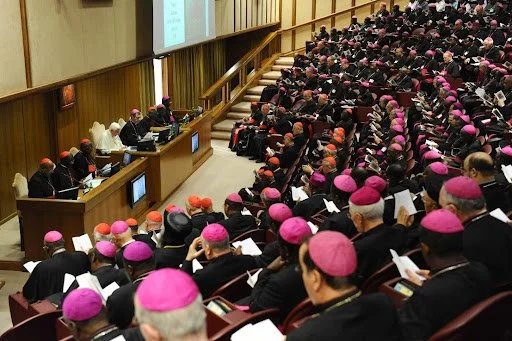The Pope’s synod will not empower the laity
Progressive Catholics are abuzz about the Synod on Synodality, and understandably so. Pope Francis is invoking the spirit of Vatican II, the presence of the Holy Spirit among all the people of God. After decades of reactionary papacies, it’s a breath of fresh air. But we should not be naive about the Synod on Synodality. We’ve been here before. Call To Action has been here before.
Call To Action emerged from a synod-like process. Exactly 50 years ago, in 1971, Pope Paul VI emphasized that Vatican II had issued a “call to action” for the laity to create a more just world. The bishops met that year, and U.S. bishops returned from the 1971 synod with a mandate to engage the laity. They developed a creative consultation process, in which over 800,000 Catholics testified at listening sessions throughout the country. This culminated in the 1976 “Call to Action” Conference in Detroit. More than 100 bishops were among the 1,340 voting delegates and 1,500 observers at the conference. The Detroit conference was a beautiful expression of lay engagement in the life of the church. Together with the bishops and clergy in attendance, delegates drafted a document demanding that the church work against racism, sexism, militarism, and poverty. It explicitly called on the hierarchy to change its position on clerical celibacy, women’s ordination, birth control, homosexuality, and the role of the laity.
U.S. bishops quickly distanced themselves from the Detroit conference. They’d invited the laity into an unprecedented consultative process, but they weren’t willing to go further. They listened, they discussed, and they didn’t act. In the decades since Detroit, U.S. bishops have persecuted Call To Action members who have carried forth the mandate from a conference convened by the bishops themselves.
Pope Francis emphasizes that listening is critical to the synodal process, but the views of the U.S. Catholic laity are no secret. We have the 1976 Detroit documents. We have countless surveys showing that the U.S. Catholic population favors birth control, gay marriage, and women’s ordination. We know what the laity want. We’ve known for decades. Pope Francis emphasizes that the synod is a process, not a poll — but the U.S. bishops have seen the polls. Many are actively hostile toward the synod process in part because they have heard what the “misguided” laity believe.
Furthermore, the very framework of listening (rather than consensus, for instance) leaves power in the hands of the hierarchy. The Synod on Synodality functions within the existing power structure of the church. Even if the laity are able to fully participate, the hierarchy will “listen” and then discuss behind closed doors. Lay Catholics will express themselves, the bishops will filter what they say, and an autocratic institution will decide whether or not to take action. That's nothing new. (For more on this, read Mary Hunt’s analysis here.)
Should progressive Catholics participate in the synod? Yes, if we feel called to do so: several of our partners have developed thoughtful resources and campaigns to raise the voices of progressive Catholics (check out offerings from Women's Ordination Conference and FutureChurch). At the same time, we should not invest too much hope in a process that is stacked against us. Telling hostile bishops what we want will not inherently build power. We can leave room for the Spirit to emerge on the local level and make an honest power analysis. If we participate in the synod, let’s also use it as a means to an end: let’s take the opportunity to unite and mobilize the laity after the bishops have listened and gone off to Rome without us. Let’s build power that does not rely on Rome’s approval.
Pope Francis wants us to be a synodal church, a church that listens. That has theological and ecclesiological significance, but we heard the same thing 50 years ago. Let’s appreciate what is meaningful about the synod process — and be clear-eyed about what kind of power it takes to build a new church.

